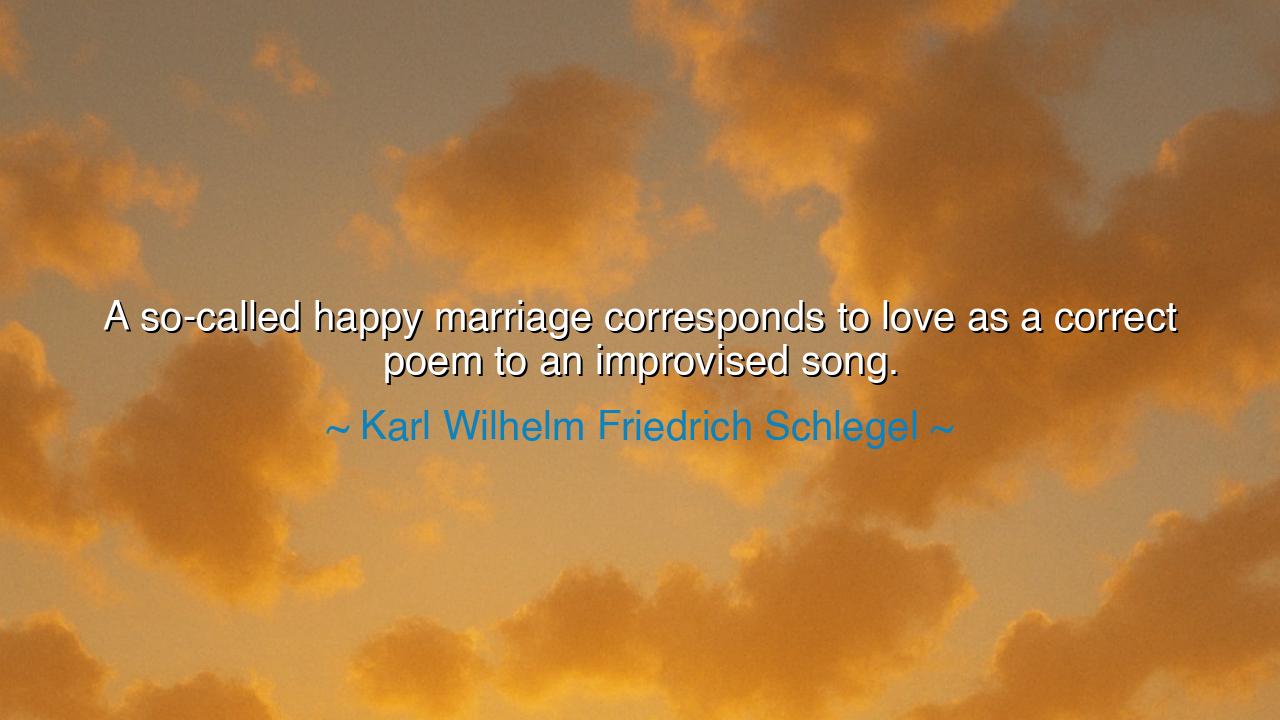
A so-called happy marriage corresponds to love as a correct poem
A so-called happy marriage corresponds to love as a correct poem to an improvised song.






“A so-called happy marriage corresponds to love as a correct poem to an improvised song.” So wrote Karl Wilhelm Friedrich Schlegel, the Romantic philosopher and poet, whose words shimmer with both beauty and irony. In this sentence, Schlegel unveils a profound truth: that love in its purest form is wild, spontaneous, and untamed, while marriage, when measured and ordered, becomes a crafted structure—a poem, carefully revised and polished. He does not condemn marriage, but he mourns the loss of its spontaneity, the quiet transformation of fire into form. In his comparison, the improvised song is passion itself—raw, unpredictable, divine—while the correct poem is the love that has been shaped into something enduring, bound by rhythm and rule.
Schlegel lived in the age of Romanticism, when poets and thinkers rebelled against the rigidity of reason and yearned for the freedom of the heart. To him, love was a sacred madness—a force that lifted the soul beyond convention. Yet he knew that society demanded order, that even love must eventually take shape within the bonds of marriage. The poet’s paradox, then, is this: can the infinite be contained within the finite? Can the song of passion endure when written upon the page of domestic life? Schlegel suggests that a happy marriage, though noble and harmonious, is not the same as the burning ecstasy of love; it is love tamed into art, emotion refined into duty, impulse disciplined into form.
Imagine, if you will, the story of Antony and Cleopatra, those lovers whose passion burned brighter than the empires around them. Their love was no poem—it was a tempest, full of triumph and ruin. It defied reason, tradition, even the laws of nations. Had they sought a quiet happy marriage, their fire might have dimmed to a candle’s glow. Yet their improvised song—tragic, ungoverned, immortal—still echoes through the ages. And so Schlegel reminds us that love, in its purest expression, is the song of the soul, sung without preparation, unafraid of discord or imperfection. Marriage, by contrast, is the poem composed after the music fades—beautiful still, but now deliberate, crafted, and contained.
Yet this is not to say that Schlegel despised marriage. He understood that the correct poem has its own majesty, its own truth. While the improvised song dazzles with freedom, it is fleeting, vanishing like a bird’s cry in the wind. The poem, shaped by discipline and care, endures; it becomes part of civilization’s memory. So too with love and marriage—one is the flame, the other the hearth. The one intoxicates; the other warms. The wise learn to cherish both, to see that passion must one day be transformed into devotion, and that the art of love lies in carrying the soul of the song into the permanence of the poem.
Schlegel’s words, therefore, are not a lament, but a reflection—a mirror held up to the human heart. He reminds us that even in the ordered beauty of a happy marriage, we must not lose the music of the heart that first awakened love. Too often, people polish their unions until they gleam with perfection but sound hollow within. They forget that behind every crafted verse there must still echo the wild, living voice of feeling. A marriage without spontaneity, laughter, and surprise becomes a statue of love—beautiful, but still.
Consider the example of Queen Victoria and Prince Albert. Their marriage began with deep affection but soon became weighed down by duty and decorum. Yet within their private letters, we glimpse the improvised melody that still played between them—a shared humor, a longing, a warmth that defied the rigid formality of court life. They built a poem of partnership, but they never wholly silenced the song of passion. In this balance lay their greatness: love civilized, but not extinguished.
So, my listener, take this teaching to heart: let your love begin as a song, pure and unguarded, but learn also to shape it into a poem—thoughtful, steady, and true. Do not let routine smother wonder, nor let duty silence the music of tenderness. For a happy marriage is not the death of love’s improvisation, but its transformation into something lasting. Keep alive the spirit of surprise, the melody of affection, even as you build a life of rhythm and reason. The greatest marriages are those in which the poem and the song coexist—the harmony of form and freedom, of structure and soul.
Thus spoke Schlegel across the centuries: that love must not be caged, nor chaos left unshaped. The art of life lies in the blending of both—the poet’s discipline and the lover’s flame. For only then does the poem breathe, and only then does the song endure.






AAdministratorAdministrator
Welcome, honored guests. Please leave a comment, we will respond soon